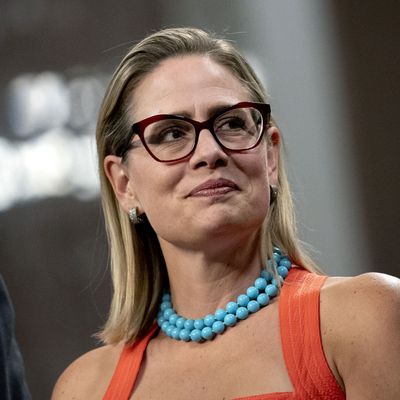
In the extended struggle on Capitol Hill between a relatively small number of “centrist” Democrats and the rest of the party over the size and shape of the Build Back Better budget-reconciliation blueprint and its relationship to Senate-passed infrastructure legislation, it’s often assumed that the “centrists” are electorally vulnerable pols facing voters in the treacherous environment of a midterm backlash against the party in power. That’s true of some of the House centrists, like Stephanie Murphy of Florida, Carolyn Bordeaux of Georgia, Josh Gottheimer of New Jersey, Jared Golden of Maine, or Vicente Gonzalez of Texas. But the much bigger wheels in the wheeling and dealing, senators Joe Manchin and Kyrsten Sinema, aren’t up for reelection in 2022 at all. They won’t face voters until 2024, and by then, who knows? We may be dealing with a new pandemic, an invasion by space aliens, or a second attempted election coup by Donald J. Trump.
Manchin gets some benefit of the doubt because his state is profoundly Republican: West Virginia gave Trump his second-best percentage in 2020 (68 percent), trailing only Wyoming as super-MAGA country. If he has any thought of running for another Senate term in 2024 (and why wouldn’t he since he’s nine months younger than presumed 2024 presidential candidate Joe Biden?), Manchin absolutely has to triangulate against his own party. And he has always been consistently on the outer conservative edge of its ideological spectrum.
Sinema is from a battleground state Biden carried in 2020 in which her party is regularly competitive these days. Many observers have tried to discern some distinctive ideology she may represent, but on those occasions when she’s not a standard-brand Democrat, she seems to have simply made a fetish of bipartisanship. And there isn’t a great deal of future in that point of view. As Ron Brownstein recently noted, the infrastructure deal (which may wind up getting only a handful of Republican votes in the House) could be the very rare exception to the rule that Republicans will not respond to even the most eager offers of cooperation across party lines. So the power of people like Manchin and Sinema, as Brownstein puts it, is “now almost entirely negative. They can block their own party’s ideas, but on virtually all issues, they can’t create the bipartisan alternative they claim to seek.”
So the question has to be asked: Why haven’t more-vulnerable Democratic senators with their own taste for bipartisanship broken with their party to the extent that Sinema has? Why aren’t they out there issuing veto threats, making demands, and happily courting the anger of progressives?
According to The Cook Political Report, four Democratic senators up for reelection in 2022 are very likely to be in competitive contests: Catherine Cortez Masto of Nevada, Maggie Hassan of New Hampshire, Ralph Warnock of Georgia, and Sinema’s Arizona colleague Mark Kelly. Cortez Masto, Warnock, and Kelly represent states very narrowly carried by Biden in 2020, and Hassan was trailing her potential Republican opponent Chris Sununu in the most recent poll. All of these senators other than Cortez Masto were part of the group that sponsored and negotiated the bipartisan infrastructure deal. Why are none of them in Sinema’s position? Yes, Kelly has echoed some of his colleague’s expressions of “concern” over the size of the reconciliation package, but he’s not shaking down his party’s congressional leaders or the White House, as far as we know.
The fundamental reality here is that the dynamics of a 50-50 Senate in which Republicans are in full and unified opposition make any one senator a potential dictator in the sense of dictating what her party can do. Most senators resist the temptation to undermine their party, particularly when it comes to public hostage-taking or posturing. Manchin probably thinks he has no choice but to stake a stand. Only Sinema has grabbed with both hands the opportunity to play the swashbuckling rogue who doesn’t give a damn about party or principle. And so she has earned much of the progressive disdain she is enduring now. As my colleague Sarah Jones said of Sinema, “She isn’t in office to pass legislation. She’s there for herself.”






























